Does the Type of Litter Box Affect Cat Social Behavior?
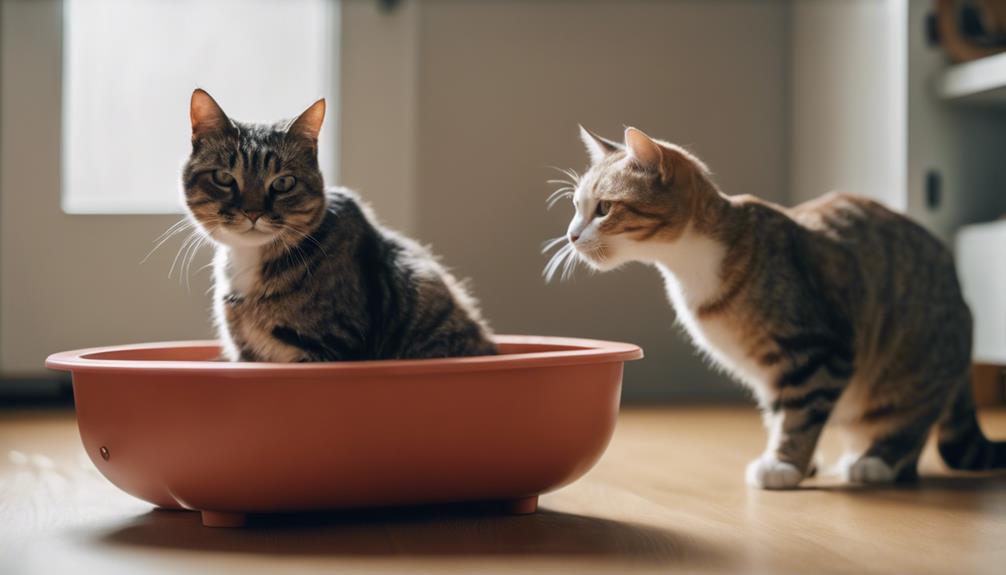
The type of litter box can influence a cat's sense of territory by providing a designated space for elimination.
It can also affect their feeling of security, as a clean and accessible litter box promotes a stress-free environment.
Furthermore, maintaining proper hygiene in the litter box can contribute to a cat's overall well-being and comfort, leading to positive social interactions with other cats and humans.
Impact of Litter Box Design
When considering the impact of litter box design on cat behavior, it's essential to evaluate how the layout and features of the box influence the cat's interaction with their elimination area. Litter box aesthetics play a significant role in determining whether a cat will use the box regularly. Cats are known to be sensitive to the cleanliness and appearance of their litter box. Therefore, a well-designed and aesthetically pleasing litter box is more likely to encourage consistent and proper use.
The size and shape of the litter box also have a profound influence on a cat's behavior. Cats prefer spacious boxes that allow them to move around comfortably and assume their preferred elimination positions. Boxes that are too small or restrictive may lead to cats avoiding the box altogether or experiencing stress during elimination. Additionally, the shape of the box can impact a cat's sense of security and privacy while using it. Cats generally prefer enclosed litter boxes that provide them with a secluded and safe environment for their elimination needs.
Relationship Between Litter Box and Aggression
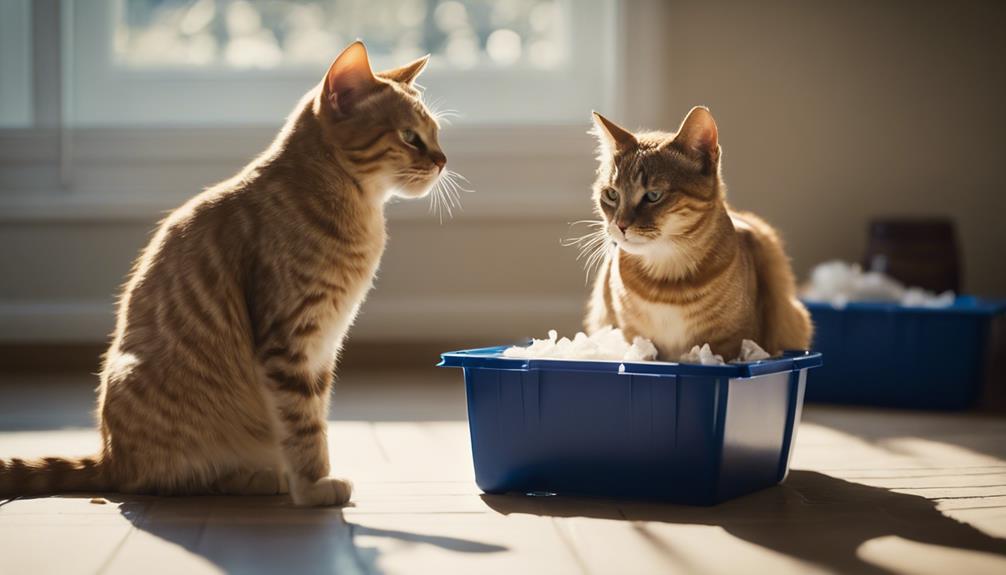
Aggression triggers in cats can be influenced by the relationship between the litter box and the cat.
The location of the litter box within the home and its cleanliness are key factors that can impact a cat's behavior and potentially lead to aggressive tendencies.
Understanding how these elements interact can provide insights into managing and mitigating aggression issues in feline companions.
Aggression Triggers in Cats
A significant factor influencing feline behavior is the relationship between the litter box and aggression in cats. Cats can exhibit aggression due to various triggers, and the litter box environment plays a crucial role in their overall behavior. Understanding these aggression triggers is essential for cat owners to provide a harmonious living environment for their feline companions.
Some common aggression triggers in cats related to the litter box include:
- Inadequate Litter Box Maintenance: Dirty or smelly litter boxes can lead to stress and provoke aggressive behavior.
- Competition Over Litter Boxes: Cats may become aggressive towards each other if they feel territorial about the litter box space.
- Incorrect Litter Type: Using the wrong litter type can cause discomfort, leading to aggression.
- Lack of Privacy: Cats prefer privacy when using the litter box; a lack of it can result in defensive aggression.
- Placement Issues: Inappropriate placement of litter boxes can cause stress and trigger aggressive responses in cats.
Litter Box Location
The location of the litter box within a cat's living space significantly influences their behavior, particularly in relation to aggression triggers. Litter box accessibility and space utilization play crucial roles in determining how comfortable a cat feels when using the litter box.
Cats may become agitated or defensive if the litter box is placed in a high-traffic area or near loud appliances. Additionally, the presence of other pets or obstacles near the litter box can lead to territorial issues and potential aggression.
Moreover, litter box odor and ventilation solutions are essential factors to consider. Poor ventilation can trap odors, causing discomfort and potentially triggering aggressive responses in cats.
Therefore, strategic placement and maintenance of the litter box are essential for promoting a peaceful environment and minimizing aggression triggers in feline companions.
Box Cleanliness Impact
Regular maintenance of the litter box significantly influences a cat's behavior and overall well-being, impacting their response to the environment. Maintaining a clean litter box is crucial for a cat's mental and physical health. Here are five key factors to consider for box cleanliness impact:
- Odor Control: Proper cleanliness helps control odors, creating a more pleasant environment for the cat.
- Litter Type: Cats have preferences for certain litter textures, so keeping the box clean with their preferred litter type can reduce stress.
- Size Suitability: Ensuring the litter box is the right size for the cat is essential for their comfort and willingness to use it.
- Litter Preference: Cats may have preferences for clumping or non-clumping litter, affecting their behavior towards the box.
- Frequency of Cleaning: Regular cleaning prevents odor buildup and encourages consistent litter box usage.
Influence on Cat-Human Bonding
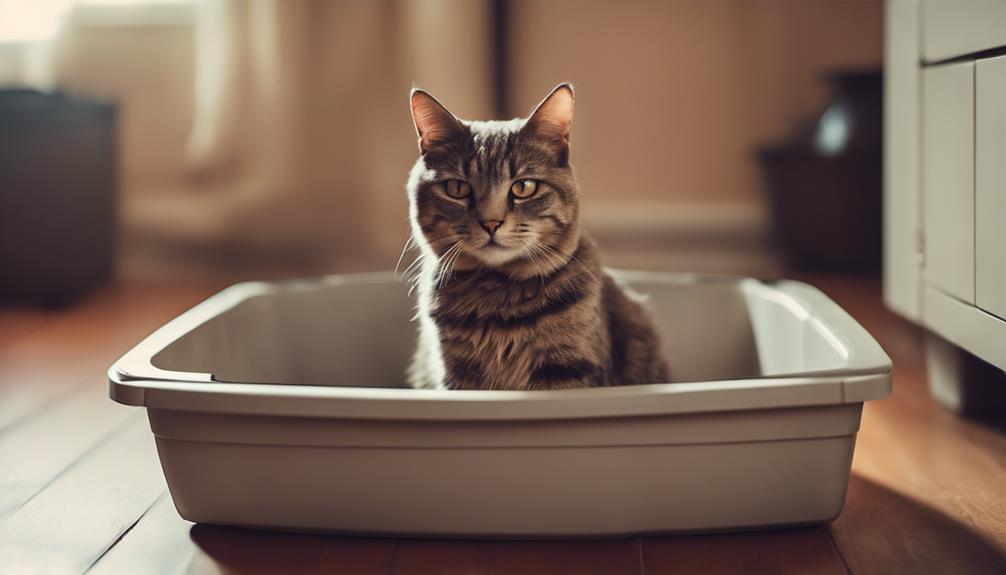
The location of the litter box can significantly impact the cat-human bonding experience. Cats may feel more comfortable and secure when the box is placed in a quiet and accessible area.
Additionally, the cleanliness of the litter box plays a crucial role in fostering a positive relationship between cats and their human companions. Cats are more likely to use a clean box, leading to a healthier environment and better interactions.
Box Location Impact
Positioned strategically, the litter box placement can significantly impact the bond between cats and their human companions. The location of the litter box can influence social interaction and behavioral changes in cats. When considering the box's placement, several key factors come into play:
- Proximity to high-traffic areas in the home
- Accessibility and ease of entry for the cat
- Presence of loud noises or other stress-inducing elements nearby
- Visibility of the box to the cat's human companions
- Integration of the box into the overall living space design
Box Cleanliness Importance
Maintaining cleanliness in the litter box is crucial for fostering a strong bond between cats and their human companions. The aesthetics of the litter box, including its cleanliness, play a significant role in ensuring the comfort of both the cat and the owner.
Cats are known for their cleanliness, and a dirty litter box can lead to stress and potential health issues for the cat. Additionally, odor control is essential for creating a pleasant environment for both the cat and the owner.
Choosing the right litter box material and size preference can also impact cleanliness. Cats may prefer certain materials or sizes, and providing them with a clean, appropriately sized litter box can enhance their overall well-being and strengthen the bond with their human caregivers.
Connection to Multi-Cat Household Dynamics
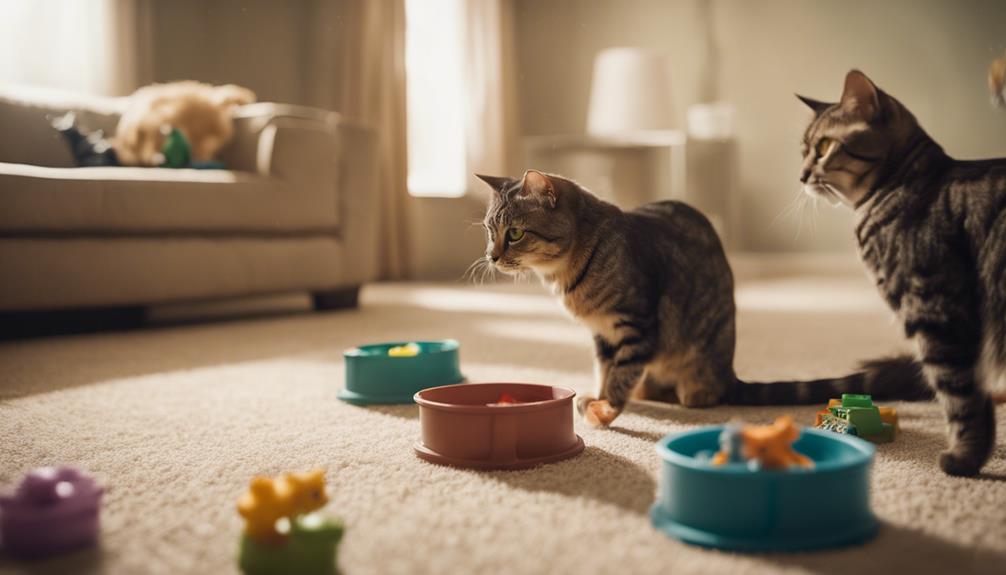
In multi-cat households, the presence and placement of litter boxes can significantly influence the dynamics among the feline residents. The relationship between cats in a shared living environment is complex and can be affected by various factors related to litter box dynamics. Here are five key points to consider:
- Number of Litter Boxes: Having an adequate number of litter boxes is crucial in multi-cat households to prevent competition and conflicts over their use.
- Placement: Strategic placement of litter boxes throughout the house can help reduce territorial disputes and promote a harmonious coexistence among the cats.
- Type of Litter: Cats may have preferences for certain types of litter, and offering a variety can cater to individual preferences, minimizing stress.
- Cleaning Routine: Maintaining a regular cleaning schedule for the litter boxes is essential to prevent odors and maintain a hygienic environment, which can positively impact cat interactions.
- Monitoring Behavior: Observing how cats interact around the litter boxes can provide insights into their social hierarchy and overall well-being within the multi-cat household.
Effects on Litter Box Territory
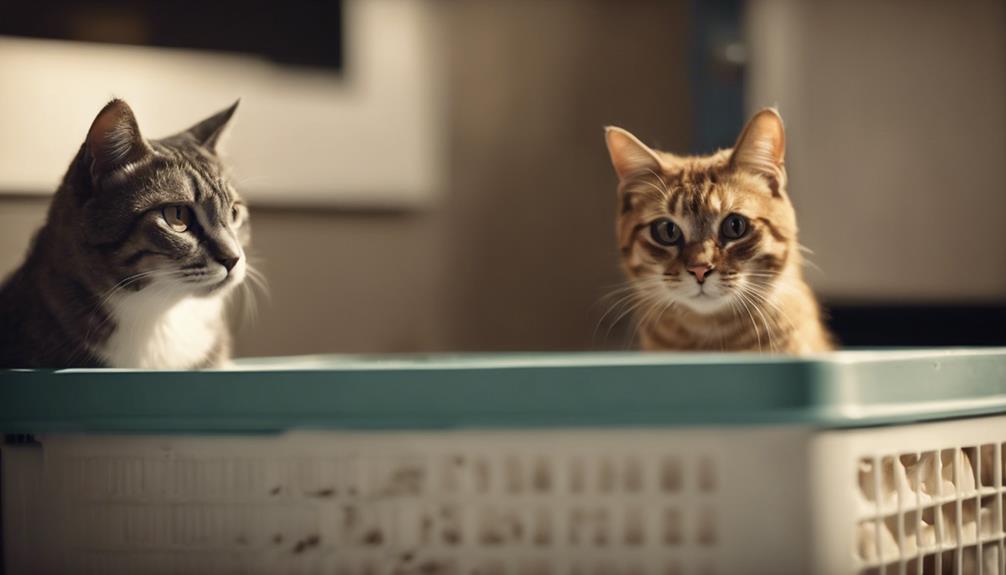
The dynamics of a multi-cat household can be intricately influenced by how cats establish and maintain their territorial boundaries around the litter boxes. The size of the litter box plays a crucial role in determining the territorial behavior of cats. In multi-cat households, having appropriately sized litter boxes can help prevent territorial disputes. Cats may feel more secure using a litter box that provides enough space for them to comfortably move around and bury their waste. Conversely, if the litter box size is inadequate, cats may avoid using it altogether, leading to inappropriate elimination behaviors.
Moreover, the material of the litter box can also impact cat behavior regarding territory. Cats may have preferences for certain litter box materials, and providing options that cater to these preferences can help reduce conflicts over litter box usage. For example, some cats may prefer open litter boxes, while others may feel more secure in covered ones. Understanding and accommodating these preferences can contribute to a harmonious cohabitation environment in multi-cat households.
Role in Stress and Anxiety Levels
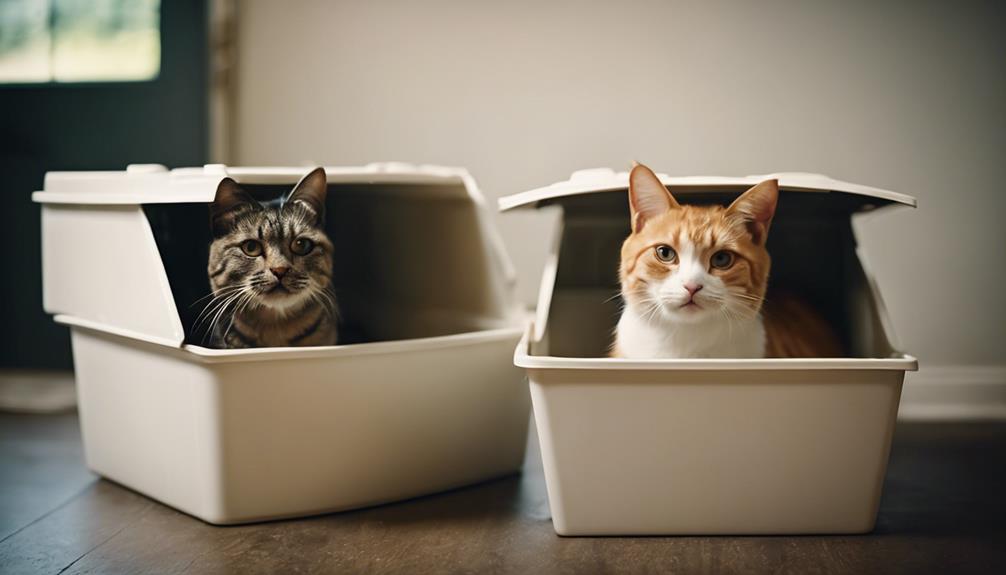
The presence of a well-maintained litter box can significantly influence a cat's stress and anxiety levels in the household. Cats are sensitive animals, and their environment plays a crucial role in their mental well-being. Factors such as litter box size and material choice can have a notable impact on how stressed or anxious a cat may feel.
- Litter Box Size:
- A cramped litter box can make a cat feel uncomfortable and stressed, leading to potential behavioral issues.
- Material Choice:
- Cats have preferences for certain litter materials, and providing the right one can reduce their anxiety levels.
- Cleanliness:
- Regular cleaning of the litter box is essential to prevent odors that could cause stress to the cat.
- Number of Boxes:
- Having multiple litter boxes in different locations can lower anxiety, especially in multi-cat households.
- Privacy:
- Cats prefer a quiet and secluded area for their litter box, offering them privacy can reduce stress and anxiety levels.
Ensuring the litter box meets these criteria can contribute to a calmer and happier feline companion.
Importance of Litter Box Placement
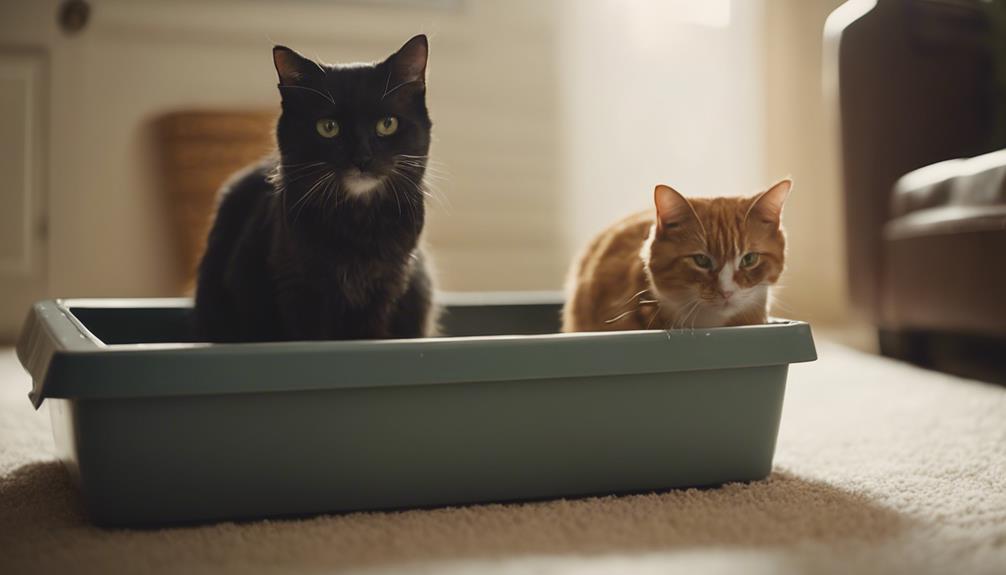
Placing the litter box strategically within the household environment can significantly impact a cat's litter box usage behavior and overall well-being. Behavioral modification in cats can be influenced by the placement of their litter box. Cats are creatures of habit and prefer their litter box to be in a quiet, easily accessible, and private location.
Placing the litter box in a high-traffic area or near loud appliances can lead to stress and anxiety in cats, affecting their litter box habits negatively. Training techniques such as positive reinforcement can be used to encourage cats to use the litter box consistently. By placing the litter box in a calm and secluded area, pet owners can promote positive litter box behavior and reduce the likelihood of accidents outside the box.
Understanding the importance of litter box placement is crucial for maintaining a harmonious environment for both cats and their owners.
Frequently Asked Questions
Can the Type of Litter Box Used Affect a Cat's Grooming Habits?
In feline care, the type of litter box can influence a cat's grooming behavior. Providing the right litter box, tailored to the cat's preferences, can enhance environmental enrichment. This can lead to improved grooming habits and overall well-being.
How Does the Design of a Litter Box Impact a Cat's Overall Health and Well-Being?
The design of a litter box impacts a cat's overall health and well-being. Proper litter box placement can influence cat behavior positively. Maintaining a clean litter box reduces odor, promoting better cat health and ensuring a comfortable environment for the feline.
Are There Specific Litter Box Features That Can Help Prevent Litter Box Aversion in Cats?
For the prevention of litter box aversion in cats, specific features like strong odor control, attractive litter, ample privacy, and easy accessibility play crucial roles. Addressing these aspects can significantly enhance a cat's litter box experience.
Does the Material of the Litter Box Influence a Cat's Preferences for Using It?
When considering a litter box, cats may show a material preference influencing their behavior. The size impact can also affect their choice. Understanding these factors can assist cat owners in providing a suitable environment for their pets.
Can the Size and Shape of a Litter Box Impact a Cat's Litter Box Training Success?
When it comes to litter box training success in cats, size preferences and shape considerations play a crucial role. Just as a well-fitted glove enhances performance, the right litter box can optimize a cat's habits.











